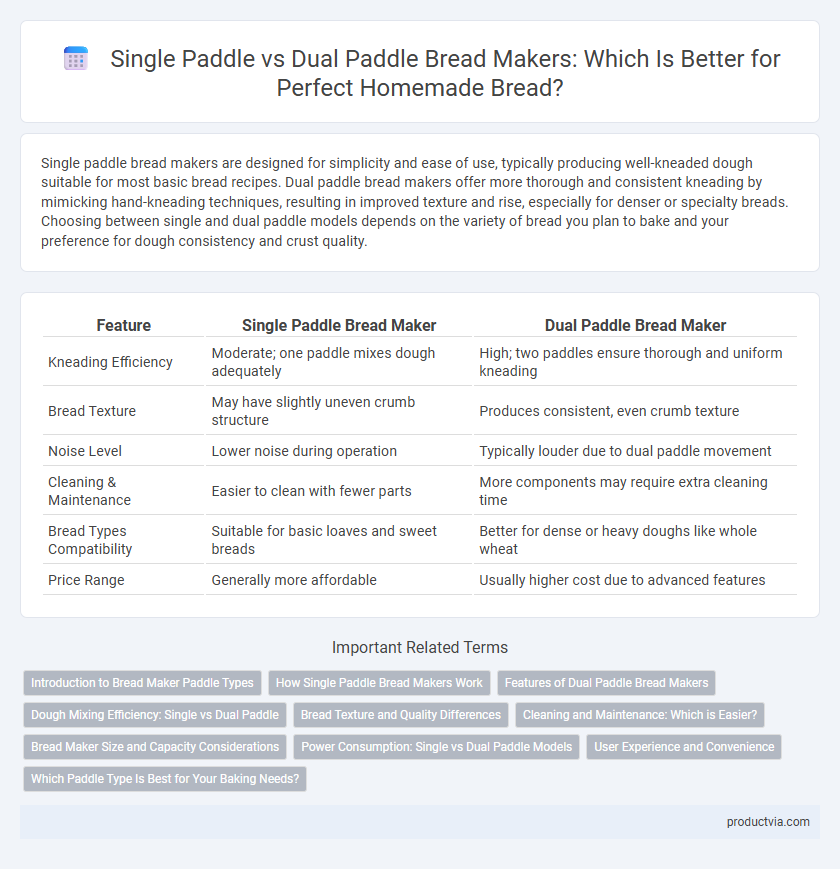Single paddle bread makers are designed for simplicity and ease of use, typically producing well-kneaded dough suitable for most basic bread recipes. Dual paddle bread makers offer more thorough and consistent kneading by mimicking hand-kneading techniques, resulting in improved texture and rise, especially for denser or specialty breads. Choosing between single and dual paddle models depends on the variety of bread you plan to bake and your preference for dough consistency and crust quality.
Table of Comparison
| Feature | Single Paddle Bread Maker | Dual Paddle Bread Maker |
|---|---|---|
| Kneading Efficiency | Moderate; one paddle mixes dough adequately | High; two paddles ensure thorough and uniform kneading |
| Bread Texture | May have slightly uneven crumb structure | Produces consistent, even crumb texture |
| Noise Level | Lower noise during operation | Typically louder due to dual paddle movement |
| Cleaning & Maintenance | Easier to clean with fewer parts | More components may require extra cleaning time |
| Bread Types Compatibility | Suitable for basic loaves and sweet breads | Better for dense or heavy doughs like whole wheat |
| Price Range | Generally more affordable | Usually higher cost due to advanced features |
Introduction to Bread Maker Paddle Types
Bread makers typically feature either a single paddle or dual paddles to knead dough effectively. Single paddle systems provide straightforward kneading suitable for most bread recipes, while dual paddle machines offer enhanced kneading efficiency and improved dough consistency. Choosing the right paddle type impacts the texture and rise of homemade bread, making it essential to understand their differences.
How Single Paddle Bread Makers Work
Single paddle bread makers use one kneading blade located at the base of the pan to mix and knead dough, ensuring even gluten development for consistent bread texture. This single paddle design simplifies cleaning and maintenance while effectively handling most bread recipes. However, it may struggle with very dense or large dough batches compared to dual paddle models, which provide more thorough kneading with two blades.
Features of Dual Paddle Bread Makers
Dual paddle bread makers offer superior kneading performance by ensuring thorough dough mixing and reducing uneven textures commonly seen with single paddle models. Their dual paddles enable more consistent kneading, resulting in uniform crumb structure and better rise in various dough types, especially dense or whole grain varieties. Enhanced motor power and paddle placement in dual paddle machines minimize wear and tear, prolonging appliance longevity and improving overall baking results.
Dough Mixing Efficiency: Single vs Dual Paddle
Dual paddle bread makers provide superior dough mixing efficiency by evenly distributing ingredients and preventing unincorporated flour pockets, resulting in a more uniform dough texture. Single paddle machines may struggle with thorough mixing, especially with dense or large batches, potentially causing inconsistent rise and texture. Choosing a dual paddle system enhances kneading performance, promoting better gluten development and improved bread quality.
Bread Texture and Quality Differences
Dual paddle bread makers typically produce bread with a finer, more uniform crumb texture by ensuring thorough and consistent kneading of the dough, which enhances gluten development and results in better rise and structure. Single paddle models may leave larger air pockets and uneven crumb due to less effective mixing, potentially causing denser or irregularly textured loaves. The choice between single and dual paddles directly impacts bread quality, with dual paddle machines generally providing superior loaf volume, softness, and evenness.
Cleaning and Maintenance: Which is Easier?
Single paddle bread makers typically offer easier cleaning and maintenance due to fewer components that can trap dough and require scrubbing. Dual paddle models may produce more evenly mixed dough but involve more crevices and parts, making thorough cleaning more time-consuming. Choosing a bread maker with detachable, dishwasher-safe paddles further simplifies the cleaning process regardless of single or dual paddle design.
Bread Maker Size and Capacity Considerations
Single paddle bread makers are typically designed for smaller loaf sizes, making them ideal for compact kitchens or limited space. Dual paddle models accommodate larger capacities, producing evenly kneaded dough for bigger loaves, often ranging from 1.5 to 2 pounds. Choosing between single and dual paddles depends on desired bread size and kitchen counter space availability.
Power Consumption: Single vs Dual Paddle Models
Single paddle bread makers typically consume less power due to their simpler motor design and fewer mechanical movements, making them more energy-efficient for everyday baking. Dual paddle models require higher wattage to operate two kneading blades simultaneously, resulting in increased power consumption but offering improved dough mixing and texture consistency. Choosing between single and dual paddle bread makers involves balancing energy use with desired bread quality and kneading performance.
User Experience and Convenience
Single paddle bread makers offer simpler operation and easier cleaning, enhancing user convenience for those who prefer minimal maintenance. Dual paddle systems provide more thorough dough kneading, resulting in better texture and consistent bread quality that appeals to baking enthusiasts. Users seeking convenience and reliable results often find dual paddles add value despite slightly increased cleaning effort.
Which Paddle Type Is Best for Your Baking Needs?
Single paddle bread makers are ideal for simple, everyday bread recipes, providing consistent kneading without overworking the dough. Dual paddle machines excel at handling dense or multigrain doughs by offering more thorough mixing and improved gluten development. Choosing between single and dual paddles depends on your preferred bread types and desired texture, with dual paddles catering to more complex baking needs.
Single paddle vs dual paddle for bread maker Infographic

 productvia.com
productvia.com